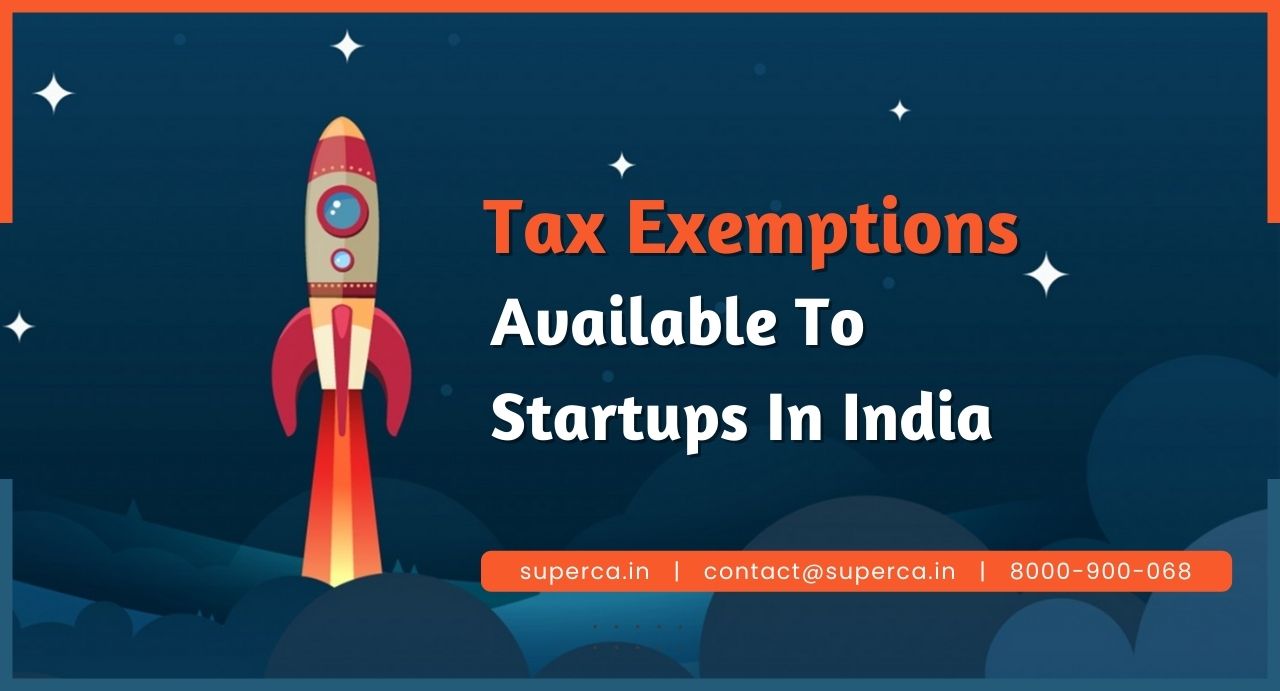Tax Exemptions Available To Startups In India
- Posted By SuperCA
- On 28 November

About StartUps and Tax Exemption
Companies that are in their first stages of operations are termed as ‘Start Ups’. They are newly formed businesses having a problem-solving mindset and are run by one or more people. Generally, startups are formed when the founders identify some flaws in the current society and intend to address the problem by developing a product/service. What distinguishes a startup from other businesses, though, is the way a startup goes about doing that. Regular companies duplicate what’s been done before whereas a startup aims to create an entirely new or modified version of services/products.
Several tax and financial incentives have been announced by the Government for startups and these benefits are being broadened every year seeing the startup wave in India. In this article we’ll discuss what privileges and tax exemption StartUp in India gets and different schemes announced by the government for the promotion of the startup wave.
Prerequisites
You must first incorporate your startUp by following all the normal procedures for registration of any business like submitting the registration application and obtaining the Certificate of Incorporation/Partnership registration. This shields your business from personal liability, provides a legal status to the startUp, provides greater stability and generates more customer attraction.
The next step is to register your company as a new venture under the Startup India program which was launched on 16 January 2016. The overall motive of Startup India is to provide a pathway for products and services to make them resourceful and innovative. Registering a business under this scheme is simple, and you can do it all online from the comfort of your own home. Logging into the Startup India website and completing the startup registration form is all that is necessary.
DPIIT Recognition
The Startup India scheme was formulated by the Department for Promotion of Industry and Internal Trade (DPIIT). Getting recognition by the DPIIT is very much necessary to access tax benefits/exemptions and easier compliance under the Startup India initiative. Other than tax benefits, startups recognized by DIPP can also avail Intellectual property Rights (IPR) related benefits such as IPR fast-tracking and more without requiring any other license from the Inter-Ministerial Board.
Your start up must meet the certain prescribed criteria to be considered eligible for DPIIT startup recognition. After successful submission of your application, you will be provided with a recognition number for your startup. The certificate of recognition will be issued after the examination of all your documents.
Cases When Businesses Not considered as StartUps
→ If Company’s age exceeds 10 years from the Date of Incorporation
→ Companies which are not incorporated as a Private Limited Company, OPC, a Partnership Firm or a Limited Liability Partnership.
→ If annual turnover exceeds Rs. 100 crore for any of the financial years since its Incorporation
→If the entity has been formed by splitting up or reconstructing an already existing business.
Tax Exemption for StartUps
Tax Exemption on Capital Gains (Section 54EE)
Eligible StartUps can claim exemption on long-term capital gains under section 54EE of Income Tax Act, 1961 if such amount or part thereof is invested in a fund notified by the central government within the time period of 6 months from the date of transfer of assets.
Exemption from Taxes for 3 Years
Eligible startups can claim up to 100% of their profits for 3 consecutive years in a block of 10 years provided that their turnover does not exceed 100 Cr in any of the previous financial years. Only companies that are DIPP recognized are eligible to claim this benefit. Start-ups have to pay only the Minimum Alternate Tax (MAT), which is calculated on the revenue reflected on the ‘book profit’ of the firm.
Tax Exemption on Investments above Fair Market Value (Section 56)
The government has exempted the tax invested above the fair market value in eligible startups. Such investments include investments made by resident angel investors or incubators that are not registered as venture capital funds.
Relaxation for carrying forward losses and set-off
The income tax law provides for the carrying forward and set off of business losses. The carry forward of losses in respect of eligible start-ups is allowed if all the shareholders of such company who held shares in which the loss was incurred continue to hold shares on the last day of the previous year in which loss has been carried forward. This set off will be denied for any private companies if there is a 50% or more change in the shareholding pattern of that company from the year in which they saw losses.
Final Thoughts
Today, the Indian government is very supportive of startups! It is the primary reason that an increasing number of Indians are entering the business world. The Government's Startup India Initiative offers a variety of incentives to encourage aspiring entrepreneurs. Many tax concessions are provided that leaves more funds in the account of startups which can be utilized to innovate on newer ideas. It will also promote the more prevalent entrepreneurial culture in India and help start-ups in building self-sustaining businesses.





